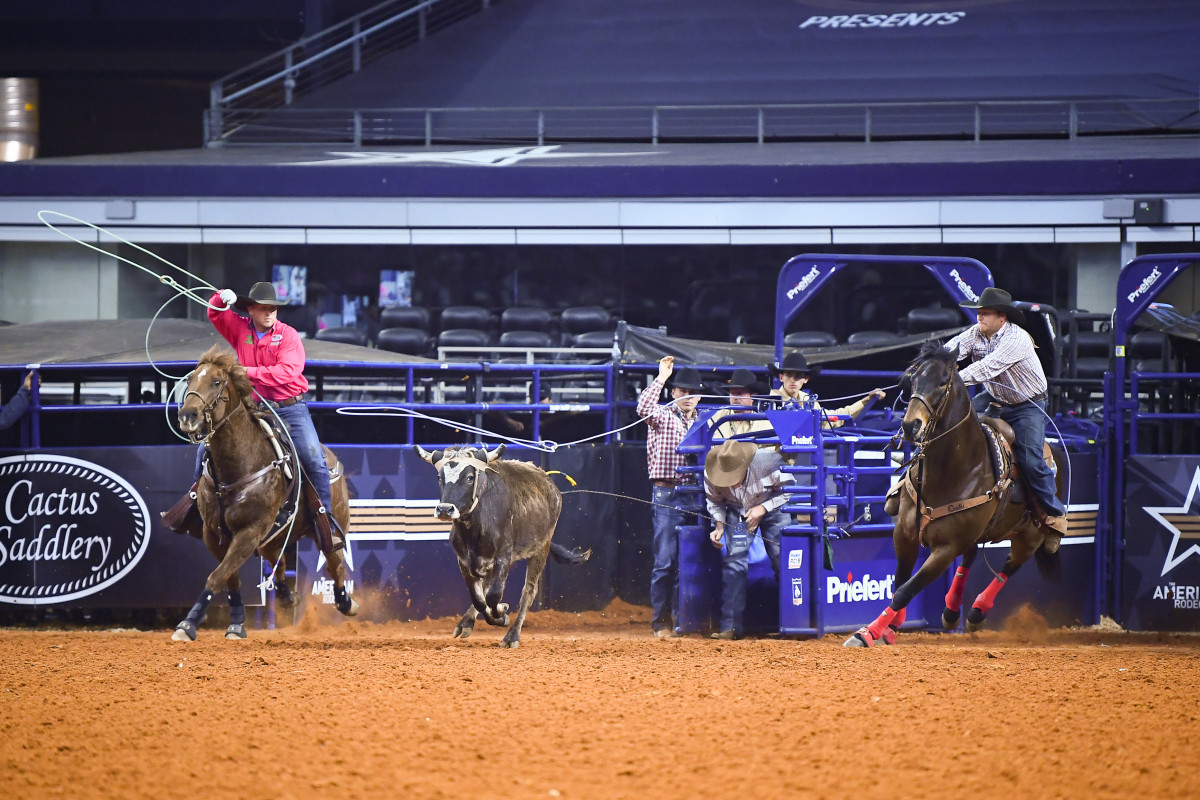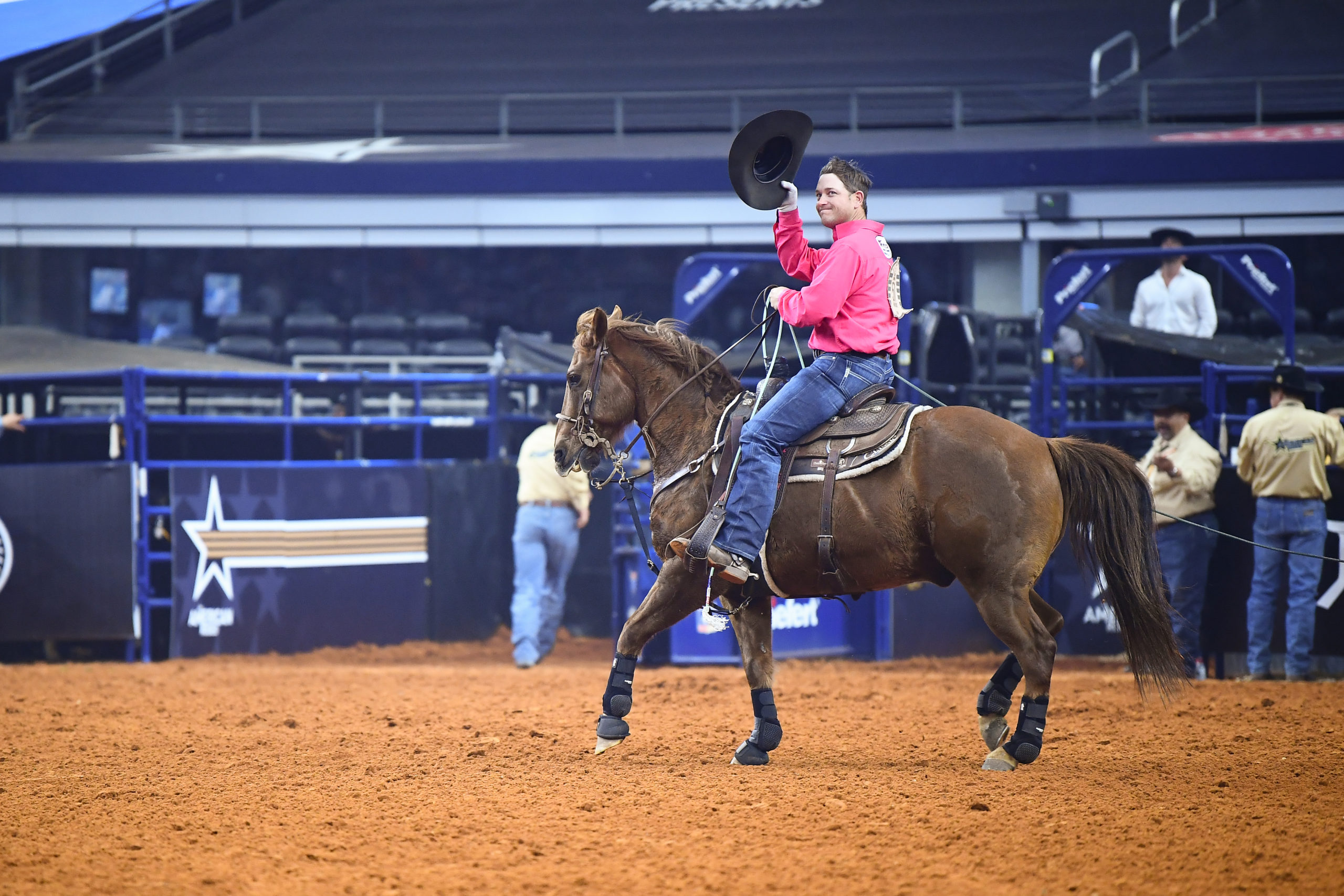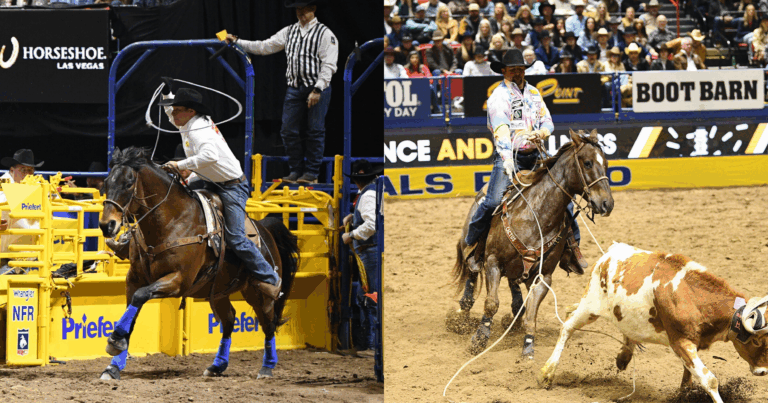Andrew Ward and Buddy Hawkins were the only team without a gold buckle on one end or the other when they backed into the box in the final four at AT&T Stadium for The American Rodeo, but that didn’t matter much.
Ward and Hawkins made a 3.69-second run to win them $100,000 a man, capping off a seven-day stretch during which they won the Lone Star Shootout and $65,750 a man, as well as their set at RodeoHouston, for another $5,750 after placing in each round and winning the second performance outright. And that’s after breaking the 27-year-old NFR aggregate record this past December in Las Vegas.
“When we started roping together, whether we were naïve or not, we believed that we were going to be a good team,” Ward said. “I couldn’t name theses roping we’d win before we did, but I believed we’d have success. I believed we’d click good and catch a lot of cows. It’s kind of boring really. That’s what we thought, and I think just having confidence in ourselves brought us wins we’re not even deserving of having.”

Ward and Hawkins roped second out in the final round, having watched Clay Smith and Jade Corkill take a no time. Then they sat at the back of the arena after they roped and watch Kaleb Driggers and Junior Nogueira and Cody Snow and Wesley Thorp fail to stop the clock.
“Our plan was to change nothing,” Hawkins added of that final run. “The exact quote from Andrew was ‘We’re not supposed to win it, but we’re supposed to make that same run again and it’s worth what it’s worth.’ It’s me and three world champion heelers, two of which were the cross-firingest young guys there are: Junior and Wesley. They’ve been talking about Wesley’s ability to throw fast since he was 10. To me, Junior just breakaway ropes there and he can do it at any given time on any horse and I do it never. There’s a significant advantage to a guy who’s won 54 motorcycles doing it. Of the four teams, the ones with the most accolades went first, and Clay had it out of his hand fast enough to be a long 2. We are team roping’s biggest fans—we know those guys are supposed to win, but they let us win that day.”
Ward and Hawkins got the $100,000 win after finishing third in one of the wolfiest rounds of team roping in recent memory in the American’s semifinal round of 10, behind Snow and Thorp’s 3.46 and Driggers and Nogueira’s 3.51 and just ahead of Smith and Corkill’s 3.86. The round was so tough, in fact, that Dustin Egusquiza and Travis Graves and Cory Kidd and Lane Mitchell did not make it back with sub-4-second runs.
“Andrew and I visited about it before we roped [in the round of 10], and I said there’d be a 3 and short 4 ahead of us by the time we went,” Hawkins said. “It was exactly what we expected. That cow was real lopey, and our run is intimidating to steers. That was a big Mexican of Bobby Joe Hill’s first time in a big building, and he was real slow and made an easy run, and now there’s five guys who you’ve showed how easy it is to be 3.”
For the last three years, The American was a PRCA-sanctioned rodeo. Some $50,000 of American earnings counted toward the PRCA’s world standings for Coleman Proctor and Ryan Motes, Luke Brown and Joseph Harrison and Erich Rogers and Paden Bray. But with its ownership change in 2022, The American is no longer a ProRodeo—meaning that Ward and Hawkins still have to go earn their third-straight NFR berth the hard way.
“It’s great if somebody wants to add a ton of money for a rodeo to count,” Hawkins said. “But I also feel like, as many unique rules as there are, it’s as unique as a Finals of itself almost like the WCRA has its own majors. There’s two ways into The American, both long, hard-fought battles. Then you have a chance at $5,000, $10,000, $15,000, $100,000. That’s a big payout within itself, and I don’t mind that it doesn’t count. For my team, we’re just very grateful to win the rodeo.”
As always, Ward was on his brown horse Biscuit, though that’s not exactly the perfect setup for the hard-running, off-the-track son of Okey Dokey Dale.
“I have a tendency of missing the barrier and getting my horse in a really bad line,” Ward admitted. “I’m just trying to make roping as easy as I can for every setup. The better start I can get and get close to the cow, the more I can keep him to the cow the better our run is going to be. The less rope I get out, the faster I can set the cow up and turn around good. It doesn’t sound hard, but when it’s a timed event you’re always trying to shave seconds. You don’t trust the process of going to the cow and setting them up good for your heeler. I’ll head my horse to the left before I throw and get really wide.
“Biscuit can fly, so sometimes that makes our runs a little slower. I have a bad habit that I pull him off the cow with my left hand. That’s being hard on myself because that’s the way I win, too. He doesn’t rate the cow, and he would run off through the horns like a bull dogging horse. In order for me to find a spot to throw, I’ll use my left hand and check him or pull him left then throw as I’m outrunning them to the left, and then I’ll slow down out there. But the reason I do that is because he’s running so hard and doesn’t ever stop. If I just put my hand down on his neck, I THINK I could get him to rate the cow, but my times would be very slow. He wouldn’t anticipate very much. Trevor Brazile’s horses can go all the way to the cow, read the cow, then drag a back leg and turn the steer fast. I’m not good at doing that. I don’t have those cues in my horse. I’ve got mine running off through the horns, then I open up to the left and throw. Sometimes it’s too radical. I get mine on bad lines and the times get slower. I’ve been doing a good job of getting closer to the cow and setting my horse up better every time. That way he’s working better.”
Lucky for Ward, his brother-in-law Hawkins knows the play and holds the steers straight to make their run come together. His grade gelding X is a big part of what makes that run work.
“He’s just a good horse,” Hawkins said. “I don’t know if I’m ever surprised by him, and that’s the best thing. He’s not been rodeoed on long enough to get in a category like Jackyl, but in the last four or five years, he’s been the winningest horse going. I ride him at the Stockyards for $700 and at lots of jackpots—I don’t just take him to the big stuff. A lot of the horses that get awards have only been ridden at 10 events a year. When you think about the greats: Roany, a guy could win on him right now. He was the same horse every run until he wasn’t anymore. Jackyl came on in that era and was good for 20 years. What’s special about Switchblade, Rey, Colonel, they did the same thing a lot. And my horse is one of the most consistent horses now. He’s not the best at anything. He goes to a good spot, lets me catch and we’ve got a lot of chemistry.”
Hawkins, 35, is building a house with his wife Tori and new daughter Anne in Stephenville, Texas. The influx of funds from the last week will surely help with those expenses. For Edmond, Oklahoma-based Ward, 31, and his wife (and Tori’s sister) Hali, the money will go back into feeding the rodeo habit and maybe even buy a place in Texas so they’re closer to the winter rodeos and jackpots.
Ward and Hawkins are 7th in the PRCA world standings with $20,089.54 won each. They rope again at RodeoHouston March 16.
The other teams in The American’s top four all won $13,333 a man for their spot in the final round, despite the no-times.
In other American Rodeo news, PBR World Champion Kaique Pacheco took home the $2 million in contender bonus money for getting to The American through the event’s qualification process. Pacheco won the final round with an 89-point ride. He was the only contender to win the event. TRJ











